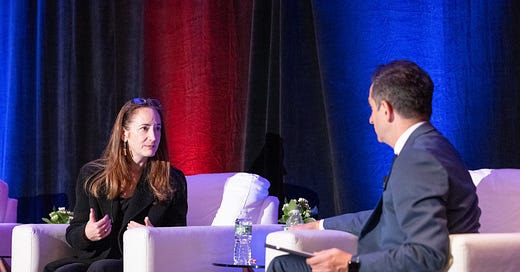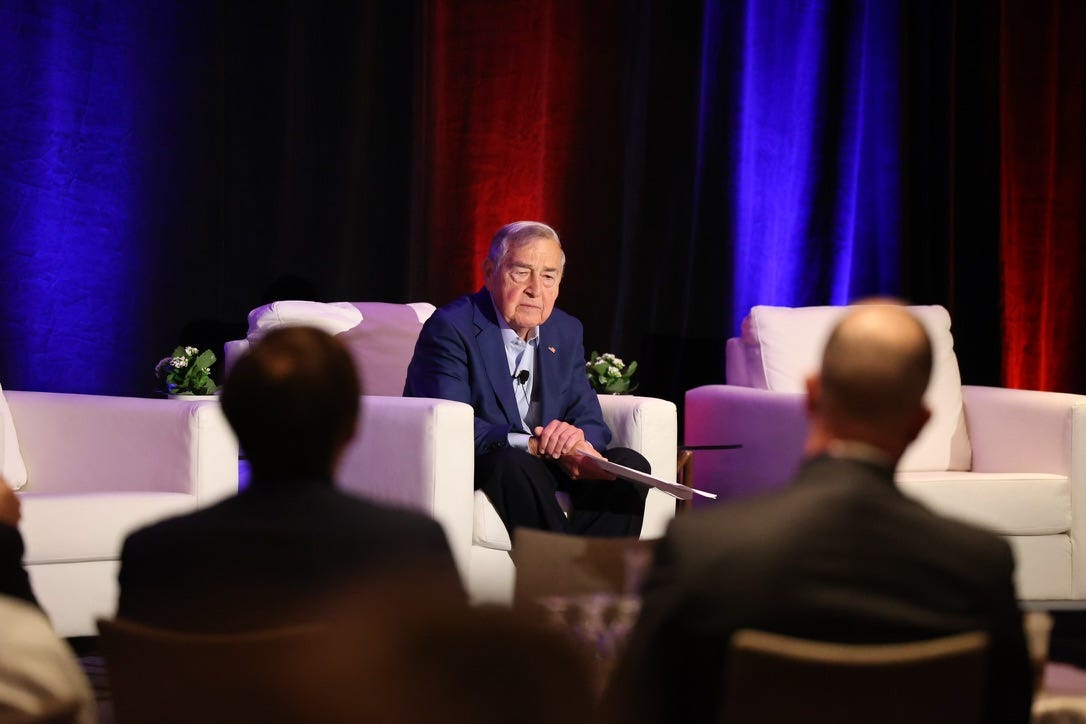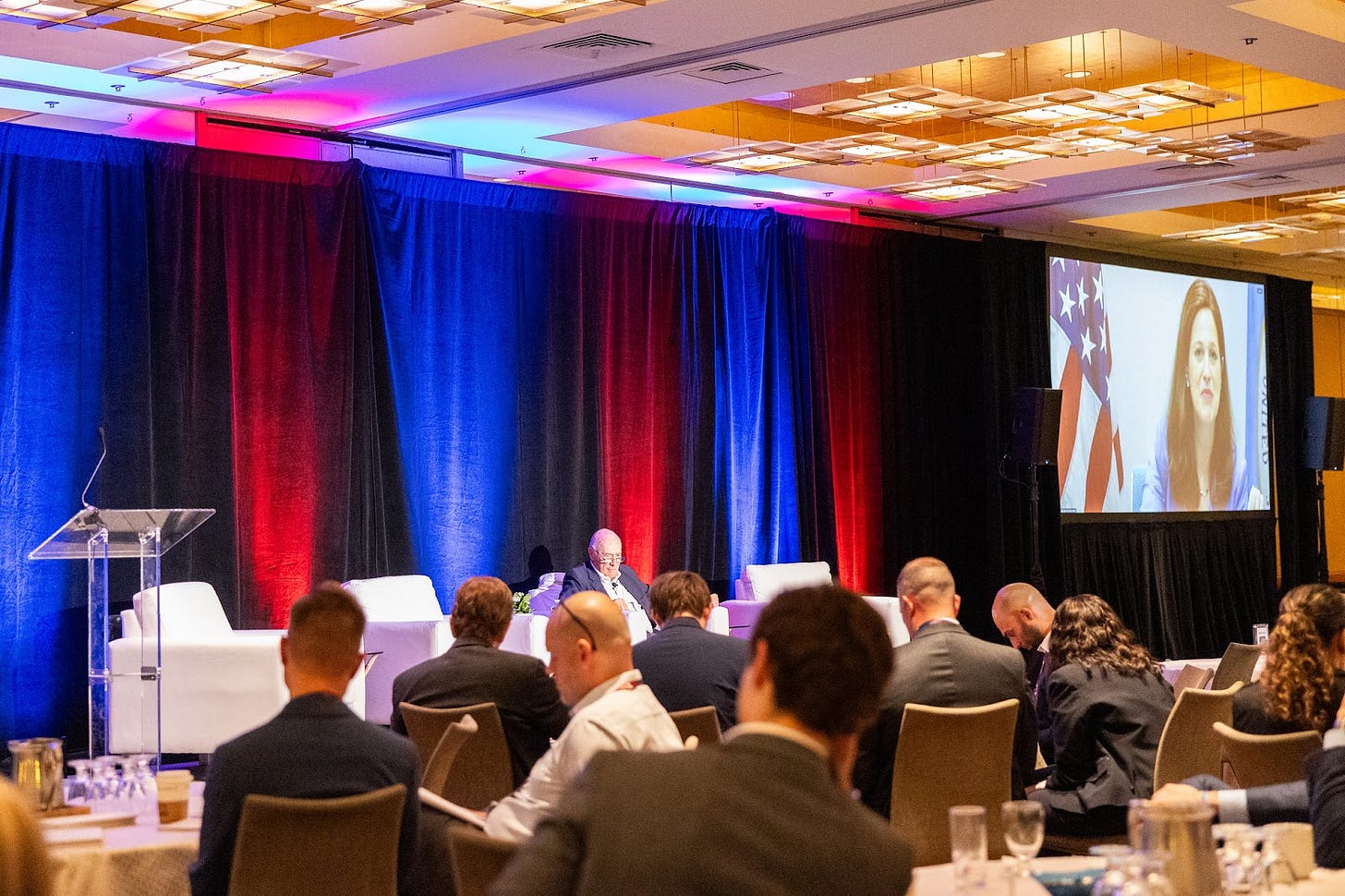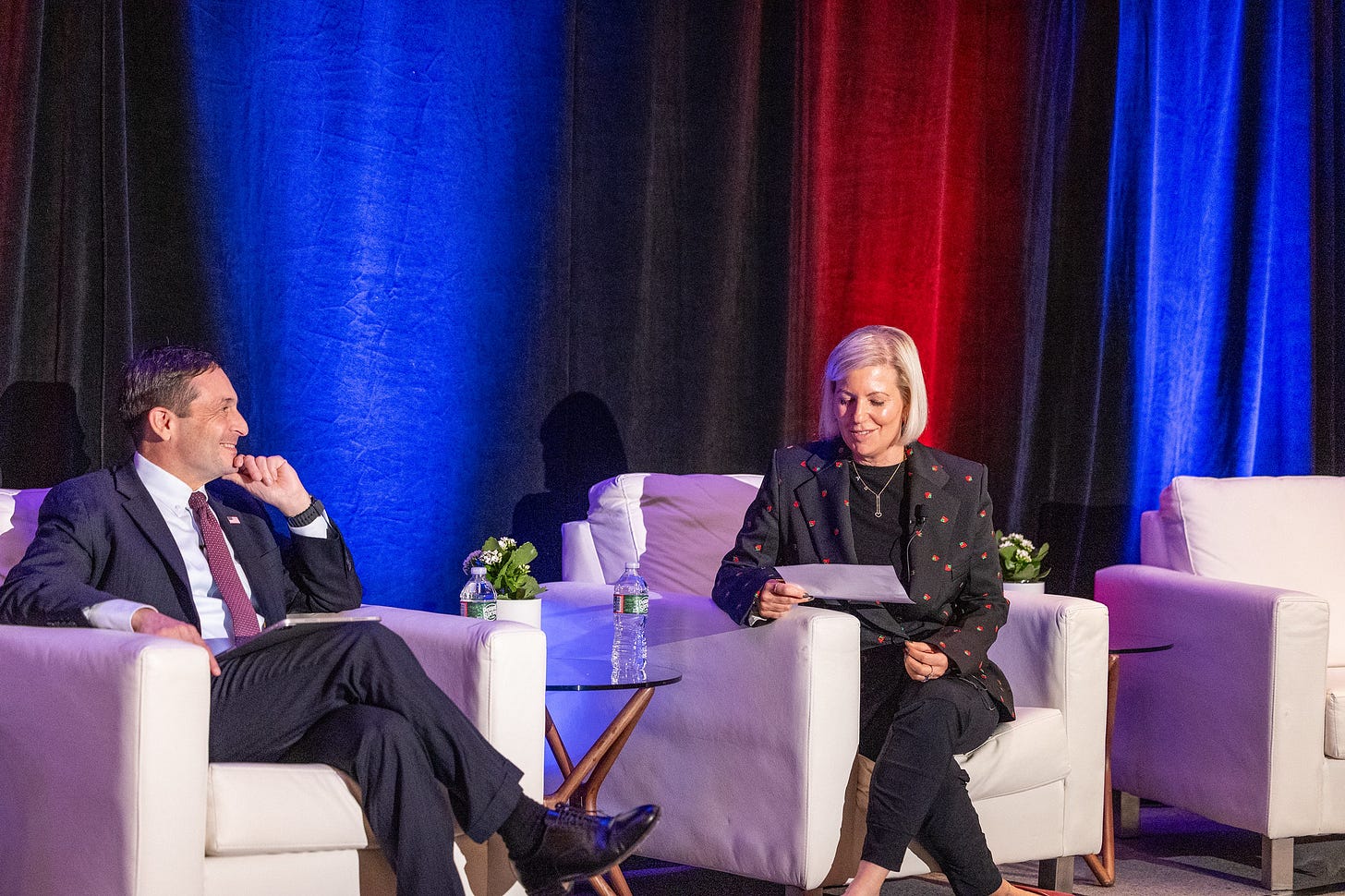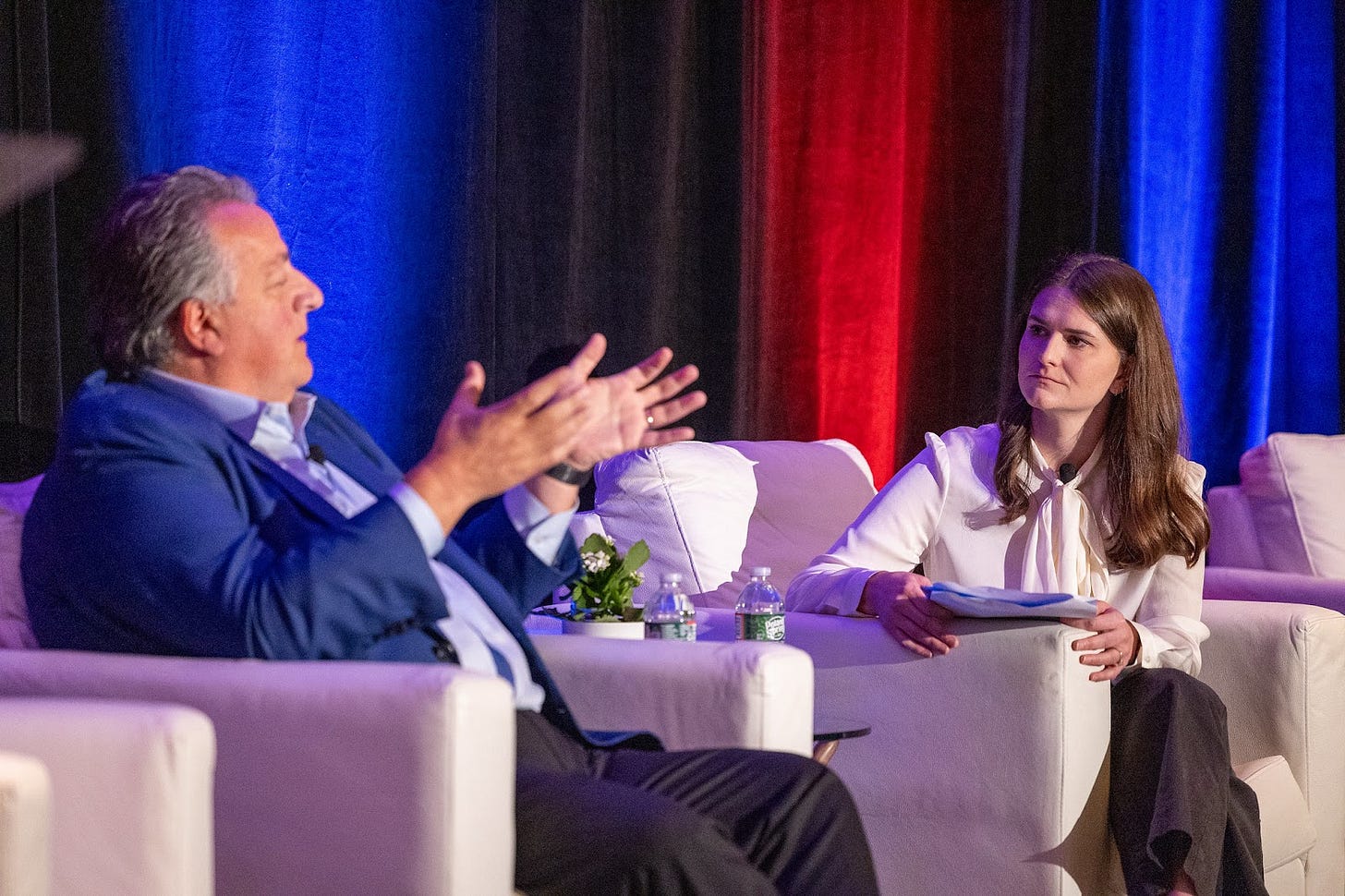The Ash Carter Exchange on Innovation & National Security: Cambridge
Highlights from the Exchange held on November 1, 2024, in Cambridge, Massachusetts, honoring the legacy of Dr. Ash Carter.
Hello, I’m Ylli Bajraktari, CEO of the Special Competitive Studies Project. In this week’s edition of SCSP’s newsletter, our Defense Team reviews key insights from our first satellite location Ash Carter Exchange on Innovation and National Security that we hosted on November 1, 2024. Stay tuned for additional announcements on our next Exchanges!
AGI House x SCSP Hackathon
Tomorrow, we are excited to bring you along with us for an AI Agents for Gov Hackathon with AGI House and George Mason University at our SCSP office! We'll be sharing updates, featuring insights from expert speakers, and showcasing the incredible work being done by the participating teams. More information about the event here.
SCSP hosted the third Ash Carter Exchange on Innovation and National Security. The Exchange aims to further advance the vision of Dr. Carter – who served as the 25th U.S. Secretary of Defense – of connecting innovation and national security, and bringing together national security leaders, visionary entrepreneurs, and cutting edge researchers. With the creation of the Defense Innovation Board, Defense Innovation Unit, and Defense Digital Service at the Pentagon, as well as his personal outreach to Silicon Valley and other innovation hubs around the United States, Dr. Carter initiated a new and crucial chapter of cooperation between the Defense Department and American firms working in emerging technology. Following his untimely death in 2022, SCSP – in partnership with Mrs. Stephanie Carter – launched the Exchange series to continue fostering this cooperation. The first two Exchanges took place in Washington, DC in May 2023 and this past May.
Earlier this month, however, we hosted the Exchange in Cambridge, MA – a critical technology hub that Dr. Carter had identified for its unique blend of top-tier academic institutions, robust research funding, and a strong ecosystem of companies working in biotech, robotics, and AI. Joined by over 400 attendees, and nearly 30 distinguished speakers, the Exchange highlighted how emerging technologies are pushing the scientific frontier, transforming the national security landscape, and necessitating a new form of partnership between academic institutions, government agencies, and the private sector.
Highlights from The Ash Carter Exchange
The Importance of Innovation Power
SCSP Chair, Dr. Eric Schmidt, joined Harvard University’s Dr. Graham Allison for a conversation on the critical importance of innovation power for national competitiveness and highlighted how advancements in technology, particularly in AI, will shape the geopolitical landscape. Dr. Schmidt emphasized that the ability to innovate and adapt swiftly and effectively will largely determine the relative power of nations, and the outcome of the U.S.-China competition. He noted the struggles of U.S. defense institutions to keep pace with the rapid product deployment timelines typical of private tech companies, creating a disconnect in national security technology adoption. He proposed ways to foster competition within the Pentagon to accelerate innovation.
The Scientific Frontier 2025-2030
Dr. Joseph E. Aoun, President of Northeastern University, joined Dr. Amy Brand, Director and Publisher of MIT Press, to discuss the future of higher education in the age of AI and technological disruption. Dr. Aoun emphasized the need to integrate AI as a fourth dimension of education alongside understanding the physical world, life, and social interactions. He outlined his concept of "humanics" – the integration of AI/tech literacy, data literacy, and human literacy – while noting that AI still lacks common sense, logic, and contextual understanding. The discussion highlighted critical challenges facing higher education, including declining enrollment trends and the need to shift from traditional education to lifetime learning, citing examples like Singapore's lifelong learning accounts. On national security implications, Dr. Aoun emphasized the importance of producing more STEM graduates, retaining international talent, and increasing university collaboration with the Department of Defense, highlighting Northeastern's new security-focused campuses in Burlington and Ireland. He stressed that maintaining America's competitive edge requires stronger partnerships between universities, industry, and government, particularly in developing human capital that can adapt to rapid technological change.
The Competitor’s Scientific Frontier
Director of National Intelligence, The Honorable Avril Haines, joined SCSP’s CEO Ylli Bajraktari to discuss how the Intelligence Community is adapting to emerging challenges. Reflecting on her return to government in 2021, Director Haines described a transformed landscape where national security expanded beyond traditional domains – exemplified by the IC's assessment of COVID-19's origins. She highlighted three key shifts in the intelligence landscape: growing bipartisan consensus on strategic competition with adversaries, increased recognition of the risks of the United States falling behind in technology development, and the critical need to leverage public-private partnerships. Director Haines emphasized the IC's evolving mission to better leverage non-state actors, noting that over 80% of critical infrastructure is privately owned and that corporate decisions increasingly shape geopolitics. She also detailed the IC's approach to the Ukraine crisis, where sharing intelligence with allies created a "virtuous cycle" of information exchange that helped rally international support before Russia's invasion.
The Role of Academia
The "Endless Frontier: The Role of Academia" panel featured Dr. Ian A. Waitz, Vice President for Research at MIT, Dr. John H. Shaw, Vice Provost for Research at Harvard University, and moderator Dr. Michael McQuade, Director of the newly created Technology and Geopolitics Project at the Belfer Center. Dr. Shaw emphasized academia's unique position in conducting fundamental research that often yields technological breakthroughs decades later, while also highlighting the growing importance of translating research findings into practical applications. Dr. Waitz addressed the challenges universities face in navigating national security concerns, particularly regarding compliance with Controlled Unclassified Information (CUI) requirements and foreign participation restrictions in emerging fields like quantum computing. Both leaders identified AI, quantum, gene therapy, and climate science as transformative technologies, with Dr. Waitz noting that quantum computing could become a practical threat to modern cryptography within 5-10 years. The speakers concluded by emphasizing the need to adapt to modern challenges in ethics, geopolitics, and emerging technologies.
Securing the Nation through Emerging Technologies
In this session, Anne Neuberger, the Deputy Assistant to the President and Deputy National Security Advisor for Cyber and Emerging Technologies, joined Dr. Joseph Nye, Harvard University Distinguished Service Professor Emeritus, to discuss the evolving role of cyber capabilities and emerging technologies in protecting national security. She highlighted how the integration of NSA's intelligence capabilities with Cyber Command's offensive operations, particularly during the fight against ISIS, marked a significant shift. DNSA Neuberger emphasized AI's dual-use potential in cybersecurity, noting it could enhance both defensive capabilities (like identifying vulnerabilities and detecting anomalies) and offensive operations, while warning about the risks of AI models trained on non-assured code. She also addressed the challenge of deterrence in cyberspace, particularly regarding ransomware threats, highlighting the administration's efforts through international cooperation with 68 countries in the Counter Ransomware Initiative and the importance of public attribution of cyberattacks to create effective deterrence.
Securing the Nation through Intelligence
Steve Bowsher, President and CEO of In-Q-Tel, joined Mrs. Stephanie Carter to discuss In-Q-Tel’s mission of seeking out and funding game-changing technologies for U.S. intelligence and defense agencies. Mr. Bowsher noted that over a 25-year history, the national security private capital ecosystem has expanded significantly. This success has been driven in part by the success of firms like SpaceX and Palantir, which have helped spark greater interest in defense tech among venture capitalists. He noted that now is a great time to be working in this space, as the role of AI, autonomous platforms, and small satellite sensors in warfighting is increasing. Leveraging the capital, experience, and creativity of this ecosystem is a vital asset for the United States as it competes with China. Additionally, coordinating with our democratic allies is vital. To this end, In-Q-Tel maintains close relationships, among others, with agencies and innovators in the UK, Australia, and Singapore.
Securing the Nation through Defense
Doug Beck, Director of the Defense Innovation Unit (DIU), joined Mrs. Stephanie Carter to discuss the growth of the DIU and its evolving role in DoD innovation. Mr. Beck explained that DIU drives innovation by approaching industry partners with the Department’s operational challenges, rather than rigid requirements, to energize creative and competitive solutions. The firms and technologies in DIU’s recent “Replicator” initiative are a testament to the promise of public-private partnerships in scalable, attritable autonomous systems for INDOPACOM. Mr. Beck argued that the DoD must rethink its culture around risk and uncertainty to empower personnel to pursue high-upside innovation rather than betting on known solutions. He also advocated in favor of reforming the budget process to enable the Department to offer commercial partners more budget certainty on future acquisitions by moving from the use of “programs of record” to “portfolios of record.”
Pushing the Frontier of Biotechnology
Dr. Noubar Afeyan, Founder and CEO of Flagship Pioneering and co-Founder of Moderna, and Harvard Medical School’s Dr. Ava Carter reflected on the rapid advancements in biotechnology and the implications for national security. Dr. Afeyan highlighted the transformative role AI is expected to play, especially in generating protein sequences and antibodies for disease treatment, though he stressed the need for safeguards against potential misuse. Public-private partnerships, like those between Moderna and DARPA, have been essential in advancing mRNA technology and quickly creating the COVID-19 vaccine, demonstrating the importance of collaboration in addressing health threats. Dr. Afeyan advocated for a proactive shift in healthcare, where data and molecular markers are used to detect diseases early, potentially reducing costs and improving outcomes. He also called for regulatory reform to support preemptive healthcare and address emerging global health challenges. Finally, Dr. Afeyan emphasized the importance of national resilience in biotechnology, especially as global supply chains and differing privacy laws present ethical and operational challenges.
Pushing the Frontier of Robotics
The AI Institute Founder and Executive Director, Dr. Marc Raibert, joined the renowned author and futurist, Mr. August Cole, in discussing the remarkable evolution in robotics over the past 50 years. He noted that, while robots have achieved impressive physical advancements, their cognitive abilities are still limited. A primary challenge remains in enhancing robots' semantic understanding and ability to generalize tasks similarly to humans. Ethical concerns such as job displacement and robot weaponization were discussed, with Dr. Raibert underscoring the need to balance regulatory measures with innovation to avoid stifling progress. The application of robotics is expanding in both civilian and military contexts, though integration into everyday home life is still limited by cost and complexity. At The AI Institute, new projects aim to make robots more autonomous, with initiatives like “Watch, Understand, Do” and “Inspect, Diagnose, Fix” to simplify programming and enable self-repair capabilities. Dr. Raibert emphasized the importance of continued investment in robotics and encouraged young people to consider careers in this field, noting the need for expertise in both technology and ethics. This discussion mirrored many of the key issues examined during SCSP’s AI+ Robotics Summit held in Washington, D.C. last month.
Pushing the Frontier of Artificial Intelligence
The panel featured Senior Advisor for National Security Policy at OpenAI, Sasha Baker, the Senior Vice President for Global AI Markets at AMD, Mr. Keith Strier, and author, Professor, and Advisor to SCSP, Dr. Chris Miller. The U.S.-China competition in AI and semiconductors was a key topic, with Dr. Miller noting that the United States leads in semiconductor technology vital for training AI models, while China is actively trying to bypass export restrictions. Mr. Strier highlighted that this rivalry extends globally, making the AI landscape increasingly complex. The heavy reliance on Taiwan for semiconductor production, where TSMC manufactures 99% of GPUs, adds geopolitical risk, as Dr. Miller pointed out, especially with China’s attempts to access restricted chips through indirect channels. Ms. Baker voiced concerns about the United States’ limited investment in AI infrastructure and a critical shortage of experts, as fewer than 1,000 specialists worldwide have the hands-on skills needed for scaling AI. Panelists agreed on the essential role of public-private partnerships, with Ms. Baker stressing the government’s duty to foster an environment that encourages innovation, particularly for national security. Looking ahead, Mr. Strier predicted that the integration of AI into robotics, alongside agentic AI systems capable of autonomous action, will define the next frontier. To maintain its lead, the United States must invest in infrastructure, workforce training, and continued cross-sector collaboration.
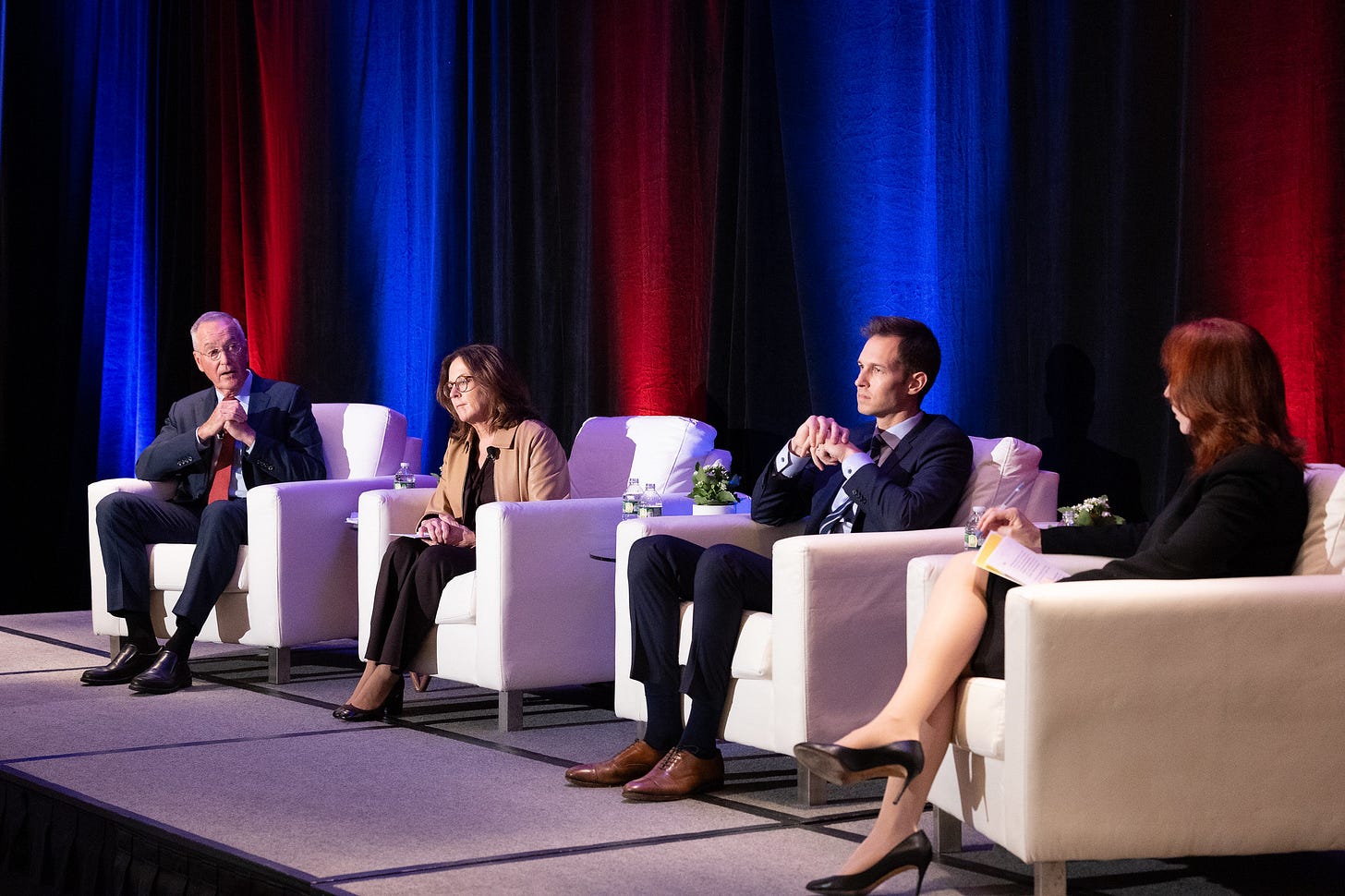
Panel on Defending the Nation
The panel featured the 19th Chairman of the Joint Chiefs, General (ret.) Joe Dunford, Massachusetts 4th Congressional District Congressman Jake Auchincloss, and the 2nd Deputy National Security Advisor for Strategy and SCSP Board of Advisors member Dr. Nadia Schadlow, as moderated by The Belfer Center Director, Dr. Meghan O’Sullivan. The panelists spoke about the need to strengthen U.S. national security through strategic clarity, technological adaptation, and global responses to international threats from rising adversarial alliances. Dr. Schadlow warned of the "Quartet of Chaos" – China, Russia, Iran, and North Korea – the challenges they pose to global stability, and the need for U.S. overmatch. Congressman Auchincloss expressed concerns about domestic political risks to national security. General Dunford emphasized the importance of transforming the U.S. military with innovative technologies that sustain, and enhance, U.S. military primacy. The panel also discussed the growing cooperation among U.S. adversaries, complicating strategic planning and requiring a U.S.-led global response.
A Strategic Imperative for Innovation and Security
The Ash Carter Exchange-Cambridge underscored an urgent call to action for the United States to strengthen its national security and innovation systems to remain competitive in a rapidly changing global landscape. The sessions stressed that achieving technological leadership requires not only investment in AI, biotechnology, and robotics but also a unified effort across government, academia, and private industry to accelerate progress and transform traditional approaches. Experts highlighted the necessity of public-private partnerships, global defense strategies, and secure, resilient supply chains as foundational to countering the strategic maneuvers of global adversaries. Now more than ever, adaptable and decisive action is critical, with speakers urging a breakdown in barriers that impede innovation and to create a robust, forward-looking framework for national defense. The message was clear: the time to align resources, reform outdated systems, and commit to collaborative progress is now if the United States is to uphold its strategic, technological, and ideological edge in the world.

